Importance of International Financial Management for Unilever
VerifiedAdded on 2023/06/08
|9
|2208
|494
AI Summary
This essay discusses the importance of international financial management for Unilever, challenges faced by the company in the international market, dividend distribution policy, efficient market hypothesis theory, and methods of appraising projects.
Contribute Materials
Your contribution can guide someone’s learning journey. Share your
documents today.

International
Financial
Management
Assessment 1
Financial
Management
Assessment 1
Secure Best Marks with AI Grader
Need help grading? Try our AI Grader for instant feedback on your assignments.
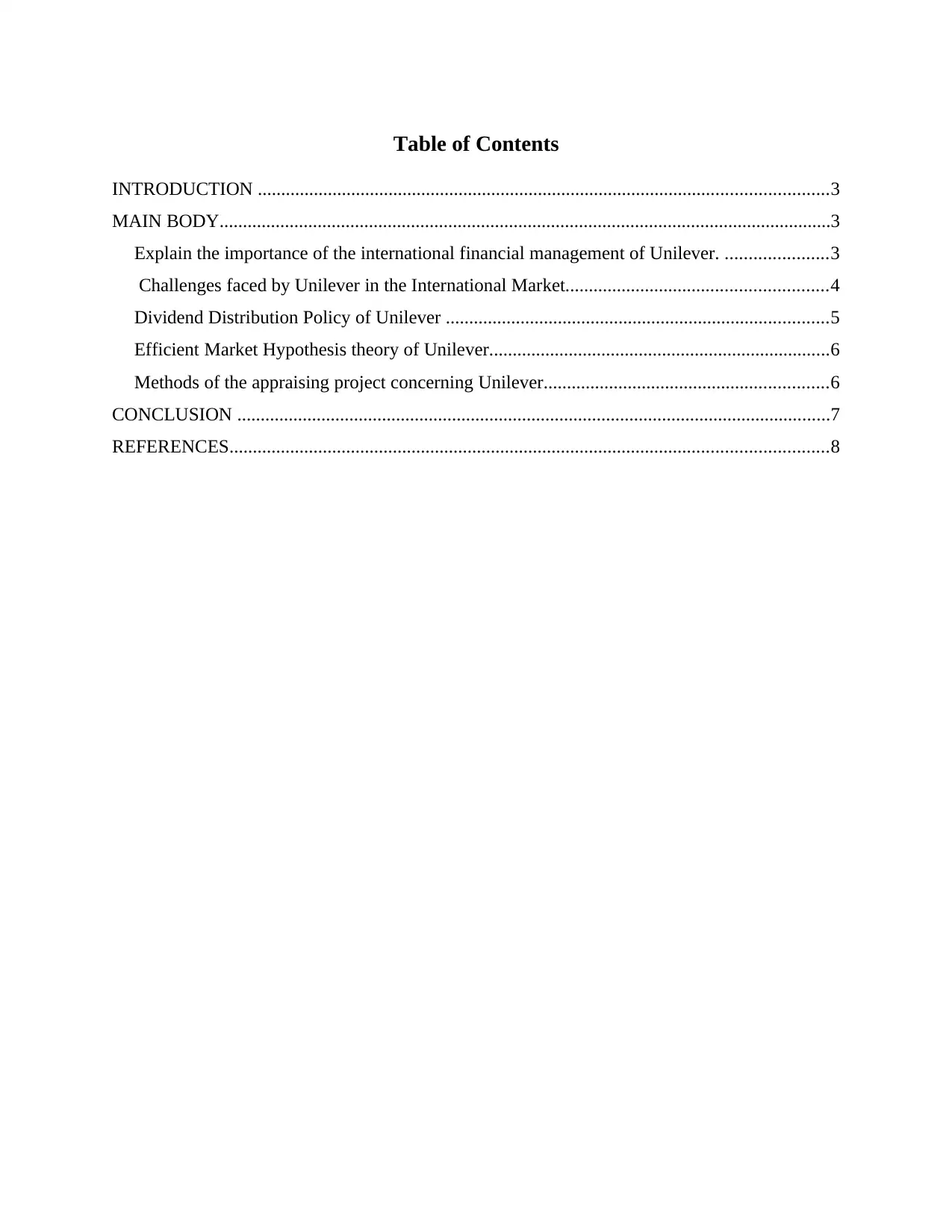
Table of Contents
INTRODUCTION ..........................................................................................................................3
MAIN BODY...................................................................................................................................3
Explain the importance of the international financial management of Unilever. ......................3
Challenges faced by Unilever in the International Market........................................................4
Dividend Distribution Policy of Unilever ..................................................................................5
Efficient Market Hypothesis theory of Unilever.........................................................................6
Methods of the appraising project concerning Unilever.............................................................6
CONCLUSION ...............................................................................................................................7
REFERENCES................................................................................................................................8
INTRODUCTION ..........................................................................................................................3
MAIN BODY...................................................................................................................................3
Explain the importance of the international financial management of Unilever. ......................3
Challenges faced by Unilever in the International Market........................................................4
Dividend Distribution Policy of Unilever ..................................................................................5
Efficient Market Hypothesis theory of Unilever.........................................................................6
Methods of the appraising project concerning Unilever.............................................................6
CONCLUSION ...............................................................................................................................7
REFERENCES................................................................................................................................8
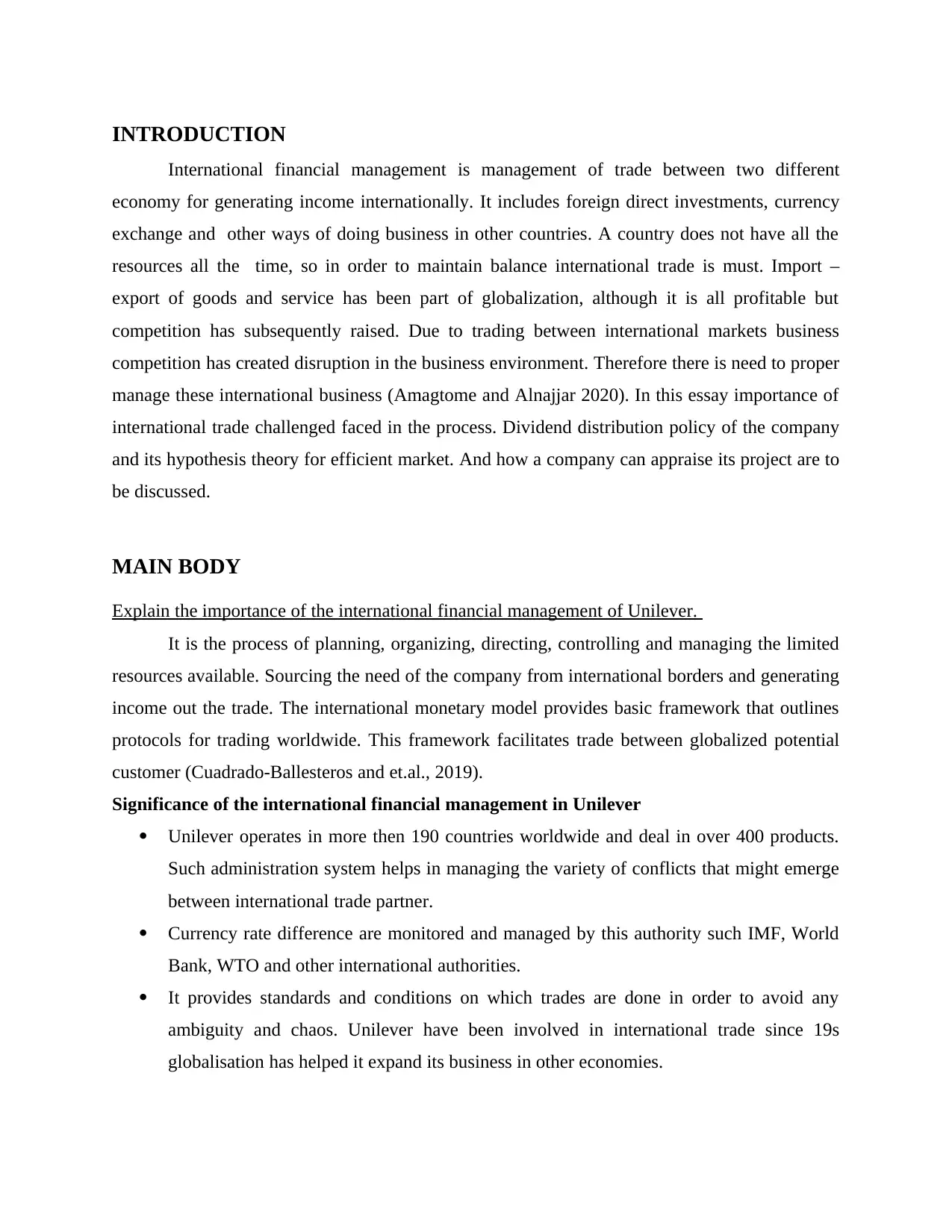
INTRODUCTION
International financial management is management of trade between two different
economy for generating income internationally. It includes foreign direct investments, currency
exchange and other ways of doing business in other countries. A country does not have all the
resources all the time, so in order to maintain balance international trade is must. Import –
export of goods and service has been part of globalization, although it is all profitable but
competition has subsequently raised. Due to trading between international markets business
competition has created disruption in the business environment. Therefore there is need to proper
manage these international business (Amagtome and Alnajjar 2020). In this essay importance of
international trade challenged faced in the process. Dividend distribution policy of the company
and its hypothesis theory for efficient market. And how a company can appraise its project are to
be discussed.
MAIN BODY
Explain the importance of the international financial management of Unilever.
It is the process of planning, organizing, directing, controlling and managing the limited
resources available. Sourcing the need of the company from international borders and generating
income out the trade. The international monetary model provides basic framework that outlines
protocols for trading worldwide. This framework facilitates trade between globalized potential
customer (Cuadrado-Ballesteros and et.al., 2019).
Significance of the international financial management in Unilever
Unilever operates in more then 190 countries worldwide and deal in over 400 products.
Such administration system helps in managing the variety of conflicts that might emerge
between international trade partner.
Currency rate difference are monitored and managed by this authority such IMF, World
Bank, WTO and other international authorities.
It provides standards and conditions on which trades are done in order to avoid any
ambiguity and chaos. Unilever have been involved in international trade since 19s
globalisation has helped it expand its business in other economies.
International financial management is management of trade between two different
economy for generating income internationally. It includes foreign direct investments, currency
exchange and other ways of doing business in other countries. A country does not have all the
resources all the time, so in order to maintain balance international trade is must. Import –
export of goods and service has been part of globalization, although it is all profitable but
competition has subsequently raised. Due to trading between international markets business
competition has created disruption in the business environment. Therefore there is need to proper
manage these international business (Amagtome and Alnajjar 2020). In this essay importance of
international trade challenged faced in the process. Dividend distribution policy of the company
and its hypothesis theory for efficient market. And how a company can appraise its project are to
be discussed.
MAIN BODY
Explain the importance of the international financial management of Unilever.
It is the process of planning, organizing, directing, controlling and managing the limited
resources available. Sourcing the need of the company from international borders and generating
income out the trade. The international monetary model provides basic framework that outlines
protocols for trading worldwide. This framework facilitates trade between globalized potential
customer (Cuadrado-Ballesteros and et.al., 2019).
Significance of the international financial management in Unilever
Unilever operates in more then 190 countries worldwide and deal in over 400 products.
Such administration system helps in managing the variety of conflicts that might emerge
between international trade partner.
Currency rate difference are monitored and managed by this authority such IMF, World
Bank, WTO and other international authorities.
It provides standards and conditions on which trades are done in order to avoid any
ambiguity and chaos. Unilever have been involved in international trade since 19s
globalisation has helped it expand its business in other economies.
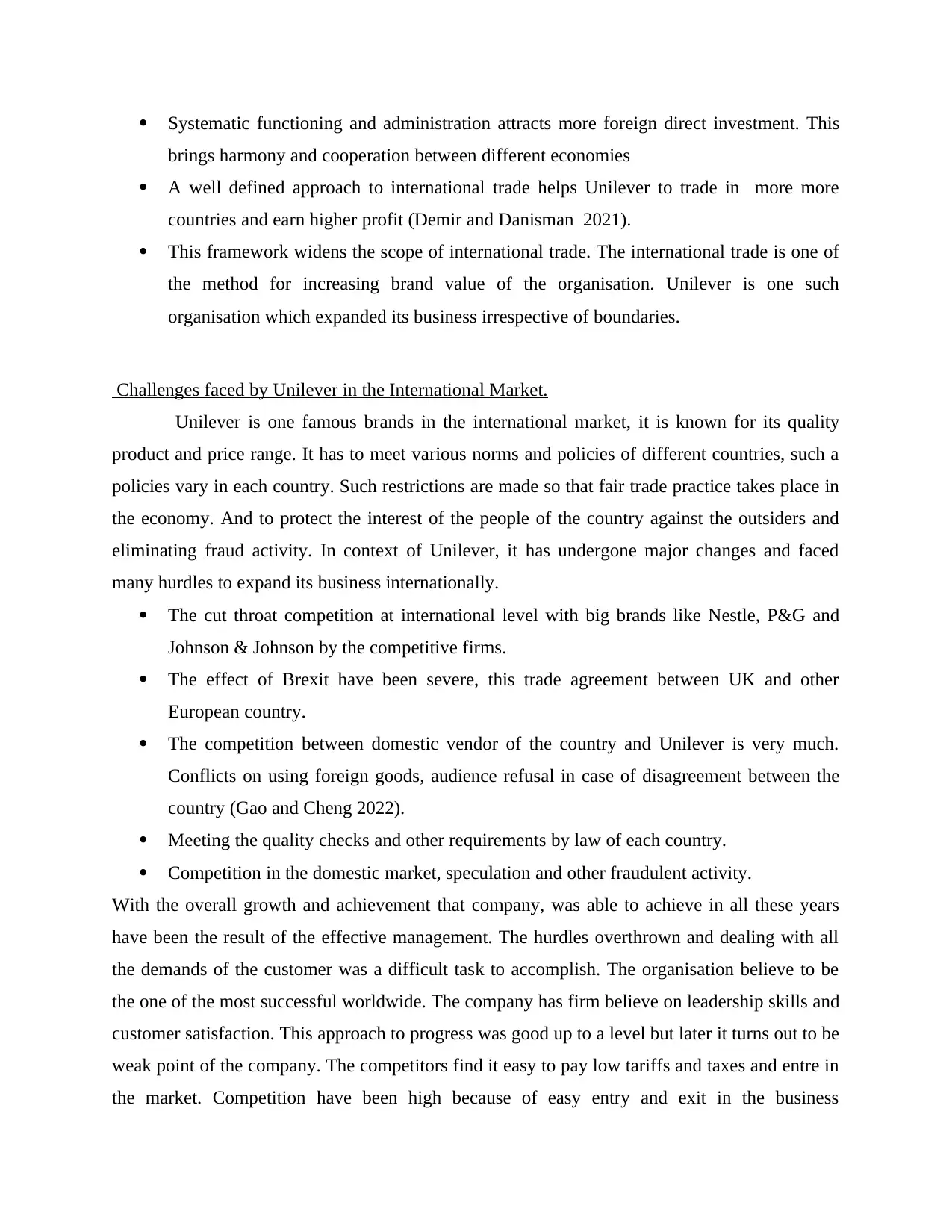
Systematic functioning and administration attracts more foreign direct investment. This
brings harmony and cooperation between different economies
A well defined approach to international trade helps Unilever to trade in more more
countries and earn higher profit (Demir and Danisman 2021).
This framework widens the scope of international trade. The international trade is one of
the method for increasing brand value of the organisation. Unilever is one such
organisation which expanded its business irrespective of boundaries.
Challenges faced by Unilever in the International Market.
Unilever is one famous brands in the international market, it is known for its quality
product and price range. It has to meet various norms and policies of different countries, such a
policies vary in each country. Such restrictions are made so that fair trade practice takes place in
the economy. And to protect the interest of the people of the country against the outsiders and
eliminating fraud activity. In context of Unilever, it has undergone major changes and faced
many hurdles to expand its business internationally.
The cut throat competition at international level with big brands like Nestle, P&G and
Johnson & Johnson by the competitive firms.
The effect of Brexit have been severe, this trade agreement between UK and other
European country.
The competition between domestic vendor of the country and Unilever is very much.
Conflicts on using foreign goods, audience refusal in case of disagreement between the
country (Gao and Cheng 2022).
Meeting the quality checks and other requirements by law of each country.
Competition in the domestic market, speculation and other fraudulent activity.
With the overall growth and achievement that company, was able to achieve in all these years
have been the result of the effective management. The hurdles overthrown and dealing with all
the demands of the customer was a difficult task to accomplish. The organisation believe to be
the one of the most successful worldwide. The company has firm believe on leadership skills and
customer satisfaction. This approach to progress was good up to a level but later it turns out to be
weak point of the company. The competitors find it easy to pay low tariffs and taxes and entre in
the market. Competition have been high because of easy entry and exit in the business
brings harmony and cooperation between different economies
A well defined approach to international trade helps Unilever to trade in more more
countries and earn higher profit (Demir and Danisman 2021).
This framework widens the scope of international trade. The international trade is one of
the method for increasing brand value of the organisation. Unilever is one such
organisation which expanded its business irrespective of boundaries.
Challenges faced by Unilever in the International Market.
Unilever is one famous brands in the international market, it is known for its quality
product and price range. It has to meet various norms and policies of different countries, such a
policies vary in each country. Such restrictions are made so that fair trade practice takes place in
the economy. And to protect the interest of the people of the country against the outsiders and
eliminating fraud activity. In context of Unilever, it has undergone major changes and faced
many hurdles to expand its business internationally.
The cut throat competition at international level with big brands like Nestle, P&G and
Johnson & Johnson by the competitive firms.
The effect of Brexit have been severe, this trade agreement between UK and other
European country.
The competition between domestic vendor of the country and Unilever is very much.
Conflicts on using foreign goods, audience refusal in case of disagreement between the
country (Gao and Cheng 2022).
Meeting the quality checks and other requirements by law of each country.
Competition in the domestic market, speculation and other fraudulent activity.
With the overall growth and achievement that company, was able to achieve in all these years
have been the result of the effective management. The hurdles overthrown and dealing with all
the demands of the customer was a difficult task to accomplish. The organisation believe to be
the one of the most successful worldwide. The company has firm believe on leadership skills and
customer satisfaction. This approach to progress was good up to a level but later it turns out to be
weak point of the company. The competitors find it easy to pay low tariffs and taxes and entre in
the market. Competition have been high because of easy entry and exit in the business
Paraphrase This Document
Need a fresh take? Get an instant paraphrase of this document with our AI Paraphraser
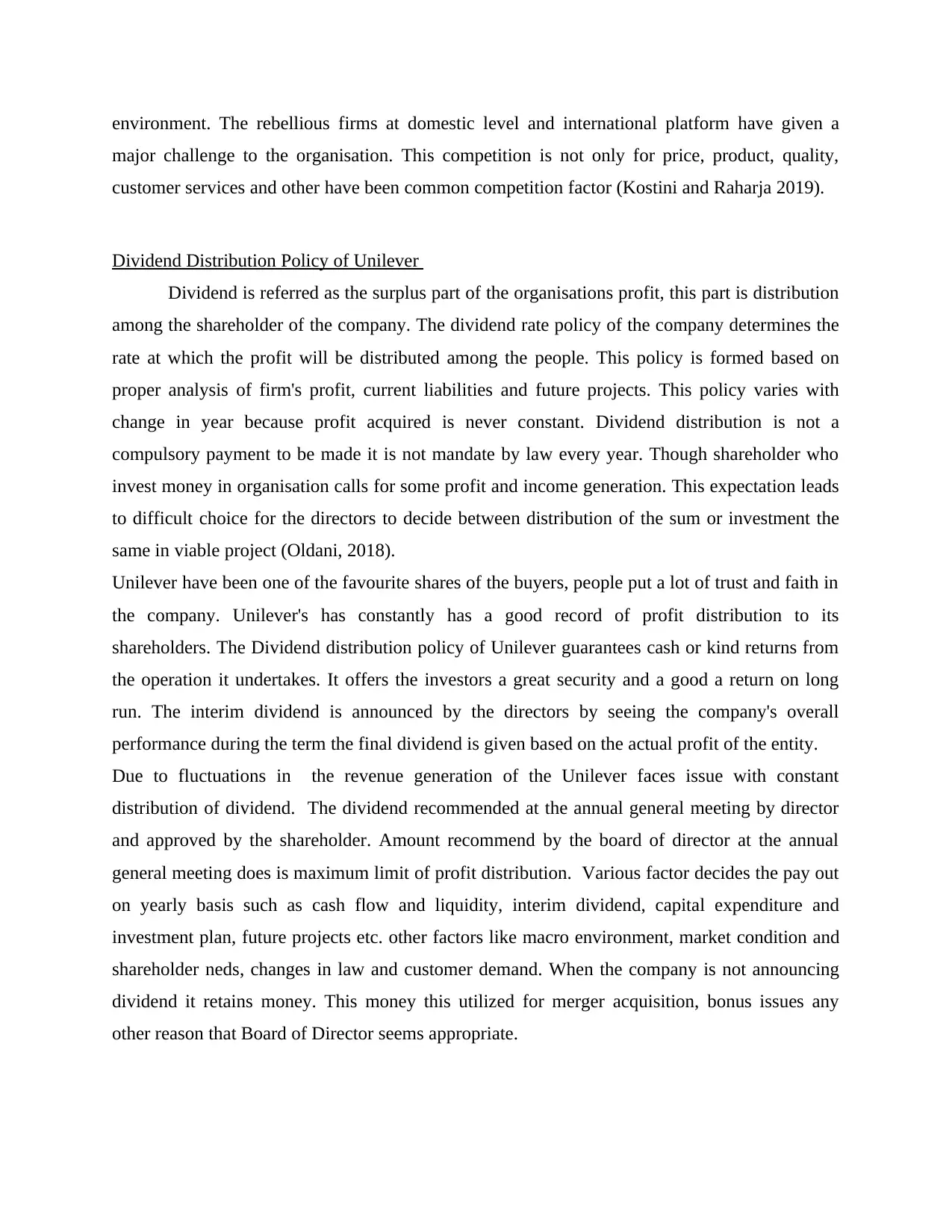
environment. The rebellious firms at domestic level and international platform have given a
major challenge to the organisation. This competition is not only for price, product, quality,
customer services and other have been common competition factor (Kostini and Raharja 2019).
Dividend Distribution Policy of Unilever
Dividend is referred as the surplus part of the organisations profit, this part is distribution
among the shareholder of the company. The dividend rate policy of the company determines the
rate at which the profit will be distributed among the people. This policy is formed based on
proper analysis of firm's profit, current liabilities and future projects. This policy varies with
change in year because profit acquired is never constant. Dividend distribution is not a
compulsory payment to be made it is not mandate by law every year. Though shareholder who
invest money in organisation calls for some profit and income generation. This expectation leads
to difficult choice for the directors to decide between distribution of the sum or investment the
same in viable project (Oldani, 2018).
Unilever have been one of the favourite shares of the buyers, people put a lot of trust and faith in
the company. Unilever's has constantly has a good record of profit distribution to its
shareholders. The Dividend distribution policy of Unilever guarantees cash or kind returns from
the operation it undertakes. It offers the investors a great security and a good a return on long
run. The interim dividend is announced by the directors by seeing the company's overall
performance during the term the final dividend is given based on the actual profit of the entity.
Due to fluctuations in the revenue generation of the Unilever faces issue with constant
distribution of dividend. The dividend recommended at the annual general meeting by director
and approved by the shareholder. Amount recommend by the board of director at the annual
general meeting does is maximum limit of profit distribution. Various factor decides the pay out
on yearly basis such as cash flow and liquidity, interim dividend, capital expenditure and
investment plan, future projects etc. other factors like macro environment, market condition and
shareholder neds, changes in law and customer demand. When the company is not announcing
dividend it retains money. This money this utilized for merger acquisition, bonus issues any
other reason that Board of Director seems appropriate.
major challenge to the organisation. This competition is not only for price, product, quality,
customer services and other have been common competition factor (Kostini and Raharja 2019).
Dividend Distribution Policy of Unilever
Dividend is referred as the surplus part of the organisations profit, this part is distribution
among the shareholder of the company. The dividend rate policy of the company determines the
rate at which the profit will be distributed among the people. This policy is formed based on
proper analysis of firm's profit, current liabilities and future projects. This policy varies with
change in year because profit acquired is never constant. Dividend distribution is not a
compulsory payment to be made it is not mandate by law every year. Though shareholder who
invest money in organisation calls for some profit and income generation. This expectation leads
to difficult choice for the directors to decide between distribution of the sum or investment the
same in viable project (Oldani, 2018).
Unilever have been one of the favourite shares of the buyers, people put a lot of trust and faith in
the company. Unilever's has constantly has a good record of profit distribution to its
shareholders. The Dividend distribution policy of Unilever guarantees cash or kind returns from
the operation it undertakes. It offers the investors a great security and a good a return on long
run. The interim dividend is announced by the directors by seeing the company's overall
performance during the term the final dividend is given based on the actual profit of the entity.
Due to fluctuations in the revenue generation of the Unilever faces issue with constant
distribution of dividend. The dividend recommended at the annual general meeting by director
and approved by the shareholder. Amount recommend by the board of director at the annual
general meeting does is maximum limit of profit distribution. Various factor decides the pay out
on yearly basis such as cash flow and liquidity, interim dividend, capital expenditure and
investment plan, future projects etc. other factors like macro environment, market condition and
shareholder neds, changes in law and customer demand. When the company is not announcing
dividend it retains money. This money this utilized for merger acquisition, bonus issues any
other reason that Board of Director seems appropriate.
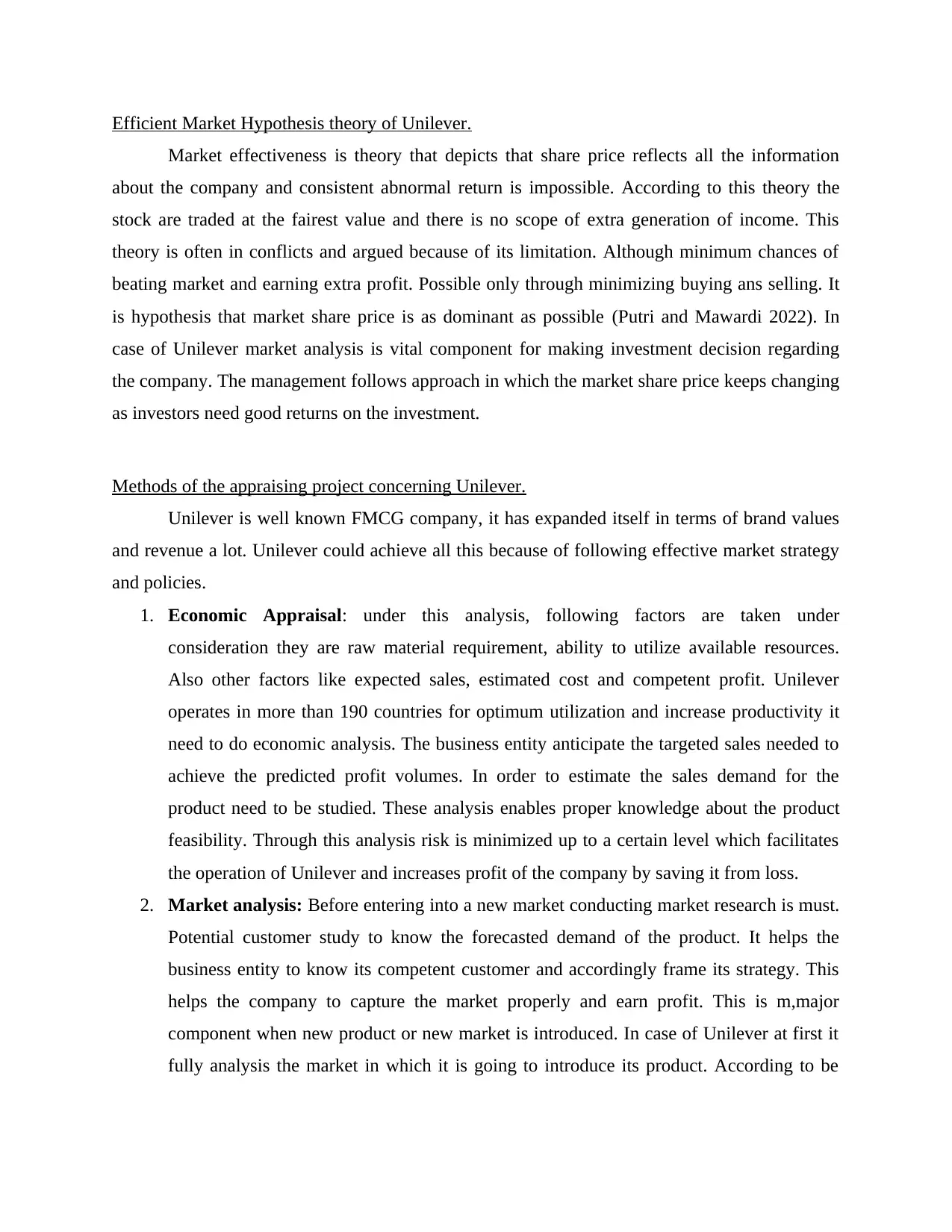
Efficient Market Hypothesis theory of Unilever.
Market effectiveness is theory that depicts that share price reflects all the information
about the company and consistent abnormal return is impossible. According to this theory the
stock are traded at the fairest value and there is no scope of extra generation of income. This
theory is often in conflicts and argued because of its limitation. Although minimum chances of
beating market and earning extra profit. Possible only through minimizing buying ans selling. It
is hypothesis that market share price is as dominant as possible (Putri and Mawardi 2022). In
case of Unilever market analysis is vital component for making investment decision regarding
the company. The management follows approach in which the market share price keeps changing
as investors need good returns on the investment.
Methods of the appraising project concerning Unilever.
Unilever is well known FMCG company, it has expanded itself in terms of brand values
and revenue a lot. Unilever could achieve all this because of following effective market strategy
and policies.
1. Economic Appraisal: under this analysis, following factors are taken under
consideration they are raw material requirement, ability to utilize available resources.
Also other factors like expected sales, estimated cost and competent profit. Unilever
operates in more than 190 countries for optimum utilization and increase productivity it
need to do economic analysis. The business entity anticipate the targeted sales needed to
achieve the predicted profit volumes. In order to estimate the sales demand for the
product need to be studied. These analysis enables proper knowledge about the product
feasibility. Through this analysis risk is minimized up to a certain level which facilitates
the operation of Unilever and increases profit of the company by saving it from loss.
2. Market analysis: Before entering into a new market conducting market research is must.
Potential customer study to know the forecasted demand of the product. It helps the
business entity to know its competent customer and accordingly frame its strategy. This
helps the company to capture the market properly and earn profit. This is m,major
component when new product or new market is introduced. In case of Unilever at first it
fully analysis the market in which it is going to introduce its product. According to be
Market effectiveness is theory that depicts that share price reflects all the information
about the company and consistent abnormal return is impossible. According to this theory the
stock are traded at the fairest value and there is no scope of extra generation of income. This
theory is often in conflicts and argued because of its limitation. Although minimum chances of
beating market and earning extra profit. Possible only through minimizing buying ans selling. It
is hypothesis that market share price is as dominant as possible (Putri and Mawardi 2022). In
case of Unilever market analysis is vital component for making investment decision regarding
the company. The management follows approach in which the market share price keeps changing
as investors need good returns on the investment.
Methods of the appraising project concerning Unilever.
Unilever is well known FMCG company, it has expanded itself in terms of brand values
and revenue a lot. Unilever could achieve all this because of following effective market strategy
and policies.
1. Economic Appraisal: under this analysis, following factors are taken under
consideration they are raw material requirement, ability to utilize available resources.
Also other factors like expected sales, estimated cost and competent profit. Unilever
operates in more than 190 countries for optimum utilization and increase productivity it
need to do economic analysis. The business entity anticipate the targeted sales needed to
achieve the predicted profit volumes. In order to estimate the sales demand for the
product need to be studied. These analysis enables proper knowledge about the product
feasibility. Through this analysis risk is minimized up to a certain level which facilitates
the operation of Unilever and increases profit of the company by saving it from loss.
2. Market analysis: Before entering into a new market conducting market research is must.
Potential customer study to know the forecasted demand of the product. It helps the
business entity to know its competent customer and accordingly frame its strategy. This
helps the company to capture the market properly and earn profit. This is m,major
component when new product or new market is introduced. In case of Unilever at first it
fully analysis the market in which it is going to introduce its product. According to be
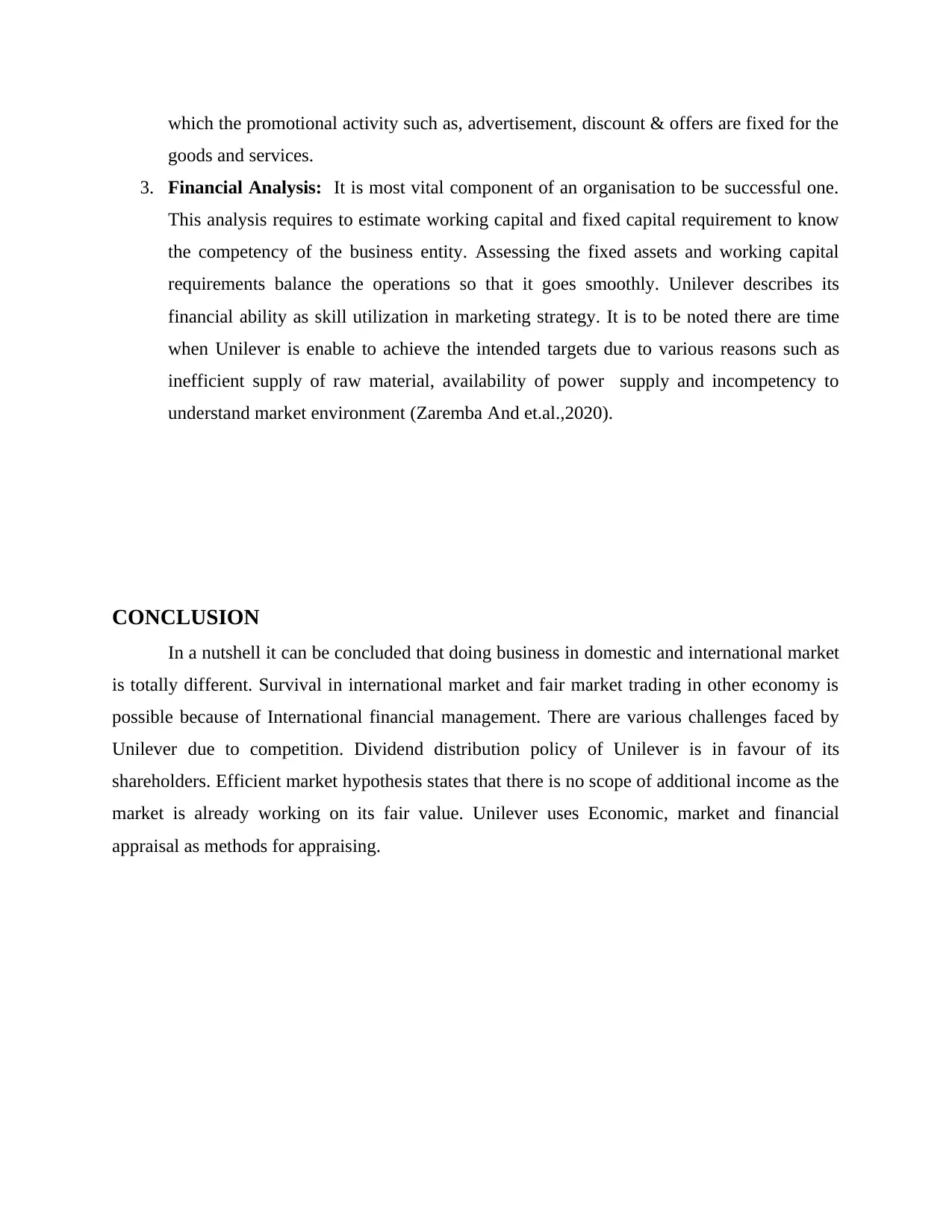
which the promotional activity such as, advertisement, discount & offers are fixed for the
goods and services.
3. Financial Analysis: It is most vital component of an organisation to be successful one.
This analysis requires to estimate working capital and fixed capital requirement to know
the competency of the business entity. Assessing the fixed assets and working capital
requirements balance the operations so that it goes smoothly. Unilever describes its
financial ability as skill utilization in marketing strategy. It is to be noted there are time
when Unilever is enable to achieve the intended targets due to various reasons such as
inefficient supply of raw material, availability of power supply and incompetency to
understand market environment (Zaremba And et.al.,2020).
CONCLUSION
In a nutshell it can be concluded that doing business in domestic and international market
is totally different. Survival in international market and fair market trading in other economy is
possible because of International financial management. There are various challenges faced by
Unilever due to competition. Dividend distribution policy of Unilever is in favour of its
shareholders. Efficient market hypothesis states that there is no scope of additional income as the
market is already working on its fair value. Unilever uses Economic, market and financial
appraisal as methods for appraising.
goods and services.
3. Financial Analysis: It is most vital component of an organisation to be successful one.
This analysis requires to estimate working capital and fixed capital requirement to know
the competency of the business entity. Assessing the fixed assets and working capital
requirements balance the operations so that it goes smoothly. Unilever describes its
financial ability as skill utilization in marketing strategy. It is to be noted there are time
when Unilever is enable to achieve the intended targets due to various reasons such as
inefficient supply of raw material, availability of power supply and incompetency to
understand market environment (Zaremba And et.al.,2020).
CONCLUSION
In a nutshell it can be concluded that doing business in domestic and international market
is totally different. Survival in international market and fair market trading in other economy is
possible because of International financial management. There are various challenges faced by
Unilever due to competition. Dividend distribution policy of Unilever is in favour of its
shareholders. Efficient market hypothesis states that there is no scope of additional income as the
market is already working on its fair value. Unilever uses Economic, market and financial
appraisal as methods for appraising.
Secure Best Marks with AI Grader
Need help grading? Try our AI Grader for instant feedback on your assignments.
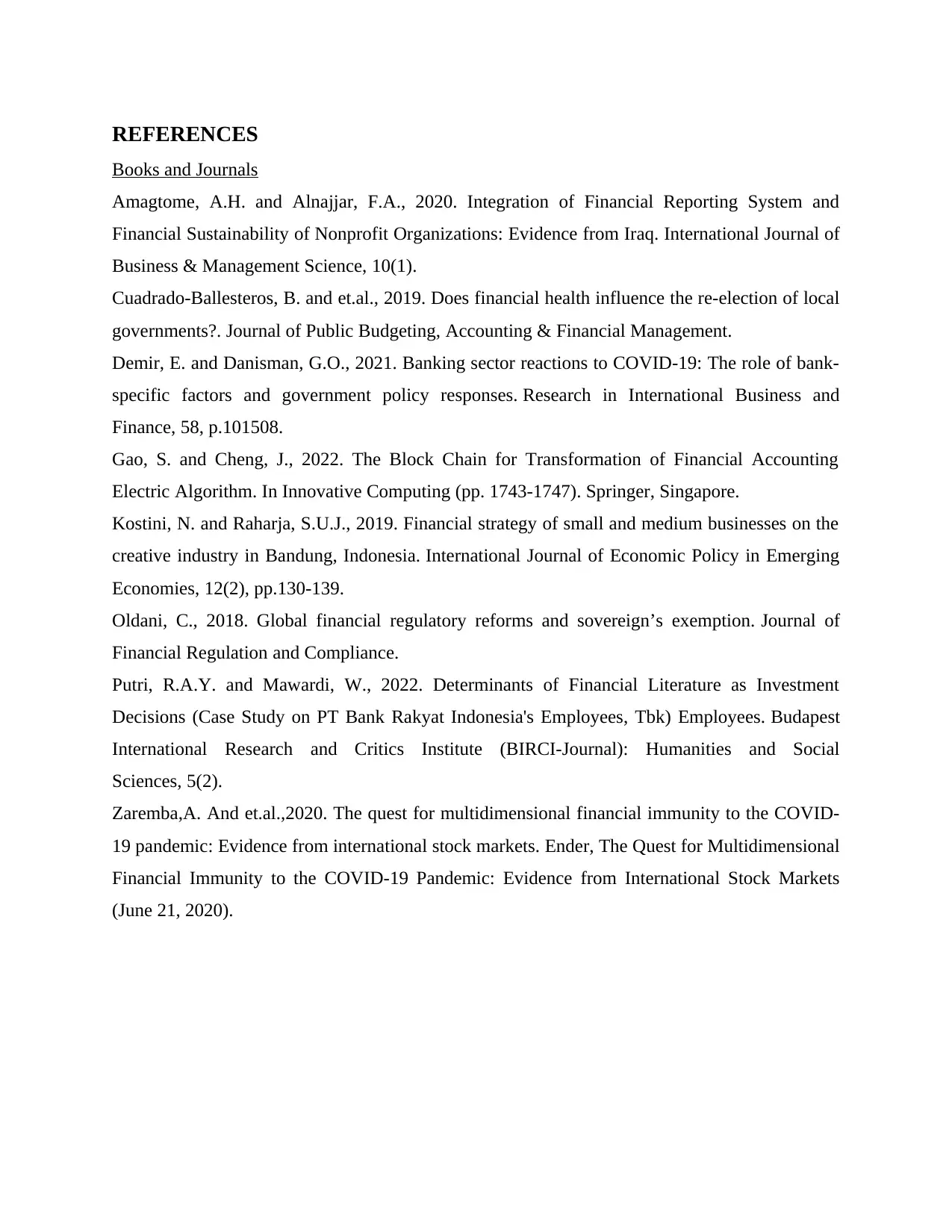
REFERENCES
Books and Journals
Amagtome, A.H. and Alnajjar, F.A., 2020. Integration of Financial Reporting System and
Financial Sustainability of Nonprofit Organizations: Evidence from Iraq. International Journal of
Business & Management Science, 10(1).
Cuadrado-Ballesteros, B. and et.al., 2019. Does financial health influence the re-election of local
governments?. Journal of Public Budgeting, Accounting & Financial Management.
Demir, E. and Danisman, G.O., 2021. Banking sector reactions to COVID-19: The role of bank-
specific factors and government policy responses. Research in International Business and
Finance, 58, p.101508.
Gao, S. and Cheng, J., 2022. The Block Chain for Transformation of Financial Accounting
Electric Algorithm. In Innovative Computing (pp. 1743-1747). Springer, Singapore.
Kostini, N. and Raharja, S.U.J., 2019. Financial strategy of small and medium businesses on the
creative industry in Bandung, Indonesia. International Journal of Economic Policy in Emerging
Economies, 12(2), pp.130-139.
Oldani, C., 2018. Global financial regulatory reforms and sovereign’s exemption. Journal of
Financial Regulation and Compliance.
Putri, R.A.Y. and Mawardi, W., 2022. Determinants of Financial Literature as Investment
Decisions (Case Study on PT Bank Rakyat Indonesia's Employees, Tbk) Employees. Budapest
International Research and Critics Institute (BIRCI-Journal): Humanities and Social
Sciences, 5(2).
Zaremba,A. And et.al.,2020. The quest for multidimensional financial immunity to the COVID-
19 pandemic: Evidence from international stock markets. Ender, The Quest for Multidimensional
Financial Immunity to the COVID-19 Pandemic: Evidence from International Stock Markets
(June 21, 2020).
Books and Journals
Amagtome, A.H. and Alnajjar, F.A., 2020. Integration of Financial Reporting System and
Financial Sustainability of Nonprofit Organizations: Evidence from Iraq. International Journal of
Business & Management Science, 10(1).
Cuadrado-Ballesteros, B. and et.al., 2019. Does financial health influence the re-election of local
governments?. Journal of Public Budgeting, Accounting & Financial Management.
Demir, E. and Danisman, G.O., 2021. Banking sector reactions to COVID-19: The role of bank-
specific factors and government policy responses. Research in International Business and
Finance, 58, p.101508.
Gao, S. and Cheng, J., 2022. The Block Chain for Transformation of Financial Accounting
Electric Algorithm. In Innovative Computing (pp. 1743-1747). Springer, Singapore.
Kostini, N. and Raharja, S.U.J., 2019. Financial strategy of small and medium businesses on the
creative industry in Bandung, Indonesia. International Journal of Economic Policy in Emerging
Economies, 12(2), pp.130-139.
Oldani, C., 2018. Global financial regulatory reforms and sovereign’s exemption. Journal of
Financial Regulation and Compliance.
Putri, R.A.Y. and Mawardi, W., 2022. Determinants of Financial Literature as Investment
Decisions (Case Study on PT Bank Rakyat Indonesia's Employees, Tbk) Employees. Budapest
International Research and Critics Institute (BIRCI-Journal): Humanities and Social
Sciences, 5(2).
Zaremba,A. And et.al.,2020. The quest for multidimensional financial immunity to the COVID-
19 pandemic: Evidence from international stock markets. Ender, The Quest for Multidimensional
Financial Immunity to the COVID-19 Pandemic: Evidence from International Stock Markets
(June 21, 2020).

1 out of 9
![[object Object]](/_next/static/media/star-bottom.7253800d.svg)



